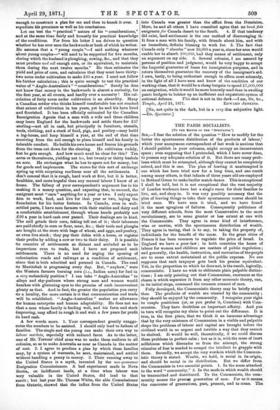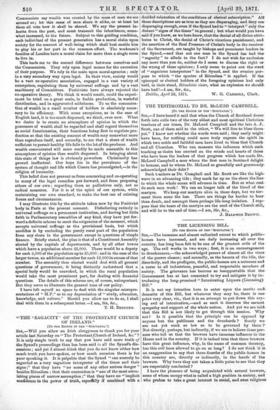THE PARIS SOCIALISTS.
[TO THE EDITOR OF THE " SPECTATOR."]
SIE,—I fear the solution of the question "How to modify for the better the spontaneous distribution of the products of labour,' which your anonymous correspondent of last week is anxious that I should publish in your columns, might occupy an inconvenient space ; even supposing that I pretended, which I have never done, to possess any adequate solution of it. But there are many prob- lems which must be attempted, although they cannot be completely solved, and this is one. The plan of leaving it unattempted is one which has been tried now for a long time, and one result among many others, is that infants of three years old are employed in Bethnal Green to make lucifer match-boxes. This is exceptional I shall be told, but it is not exceptional that the vast majority of London workmen have but a single room for their families to live, eat, and sleep in. It was very possibly necessary that the plan of leaving things to take their spontaneous course should be tried once. We have seen it tried, and we have found it the most egregious of failures. Consequently politicians of very different schools, from the most Conservative to the most revolutionary, are to some greater or less extent at one with the Communists. They agree in some kind of interference, wise or unwise, with the spontaneous distribution of wealth. They agree in taxing, that is to say, in taking the property of, individuals for the benefit of the mass. In the great cities of France it has been common to regulate the price of bread. In England we have a poor-law ; in both countries the hours of labour for women and children are matters of public regulation ; and generally, the health, instruction, and recreation of the peeple are to some extent maintained at the public expense. No one supposes that each taxpayer gets back his precise equivalent. Yet, in the proportion to which he does not, is the result, logically, communistic. I have no wish to obliterate plain palpable distinc- tions; I am only pointing out that Communism, enormous as the chasm is which separates it from any other economic theory, can, in its initial steps, command the common consent of men.
Fully developed, the Communistic theory may be briefly stated thus. The products of wealth are created by the community ; they should be enjoyed by the community. I recognize your right to couple positivism (or, as you prefer it, Comtism) with Com- munism. They have doubtless an important affinity. And you in turn will recognize my claim to point out the difference. It is true, in the first place, that we think it an immense advantage that by the very existence of Communism in a visible and palpable shape the problems of labour and capital are brought before the civilized world in so urgent and terrible a way that they cannot be shelved. It would be well, theoretically, if we could discuss these problems in perfect calm ; but as it is, with the mass of inert selfishness which dissuades us from the attempt, the strong stimulus of fear is needed to compel the intellect to grapple with them. Secondly, we accept the very words in which the Commun- istic theory is stated. Wealth, we hold, is social in its origin, and should be social in its distribution. But we differ from the Communists in two essential points. 1. In the sense attached to the word "community." '2. In the mode in which wealth should be transmitted and distributed. To the Communists, the com- munity means the preseat generation of men. For us it means the concourse of generations, past, present, and to come. The Communists say wealth was created by the mass of men we see around us ; let this mass of men share it alike, or at least let them all vote how it shall be shared. We say the present in- herits from the past, and must transmit the inheritance, some- what increased, to the future. Subject to this guiding condition, each individual of the present generation has a moral claim upon society for the amount of well-being which shall best enable him to play his or her part in the common effort. The workmen's families of London have a moral claim for more than a single room to live in.
This leads me to the second difference between ourselves and the Communists. They rely upon legal means for the execution of their purpose. We rely in the main upon moral agencies ; only in a very secondary way upon legal. In their view, society would be a vast co-operative association, engaged in a vast variety of enterprises, regulating them by universal suffrage and by a vast machinery of Committees. Positivists have always rejected the co-operative theory. We think it would result, could the experi- ment be tried on a great scale, in feeble production, in wasteful distribution, and in aggravated selfishness. To us the concentra- tion of wealth in a small number of holders is absolutely neces- sary to its efficiency. With some exceptions, as in the case of English land, it is too much dispersed, we think, even now. What we desire is to create an atmosphere of opinion in which the possessors of wealth shall be regarded and shall regard themselves as social functionaries, their functions being first to regulate pro- duction so that the existing amount of wealth may somewhat more than reproduce itself, and secondly, to see that a share of wealth sufficient to permit healthy life falls to the lot, of the producer. And wealth concentrated will more readily be made amenable to this atmosphere of opinion than wealth dispersed. In bringing about this state of things law is obviously powerless. Christianity has proved ineffectual. Our hope lies in the prevalence of the system of thought and life which Comte has promulgated,—in the religion of humanity.
This belief does not prevent us from concurring and co-operating in many of the legal remedies put forward, and from proposing others of our own ; regarding them as palliatives only, not as radical measures. For it is of the spirit of our system, while maintaining our own standard, to make the best use of existing forces and circumstances.
I may illustrate this by the attitude taken now by the Positivist body in Paris at the present moment. Disbelieving entirely in universal suffrage as a permanent institution, and having but little faith in Parliamentary assemblies of any kind, they have put for- ward a definite scheme to meet the exigencies of the moment, which accepts universal suffrage as the provisional basis, but which modifies it by excluding the purely rural part of the population from any share in the government except in questions of -simple finance. Briefly stated, the plan is that of a Constituent Assembly elected by the capitals of departments, and by all other towns which have a population above 26,000. There would be a deputy for each 2,500 of the population up to 25,000; and in the case of the larger towns, an additional member for each 12,000 in excess of that number. The assembly thus elected would deal with all general questions of government, it being distinctly understood that a special body would be convoked, in which the rural population would take the most prominent part, for dealing with financial questions. The details of this scheme are, of course, unimportant. But they serve to illustrate the general tone of our policy.
I have left myself no space to deal with the singular misrepre- sentations of " M.P." as to my depreciation of "study, education, knowledge, and culture." Should you allow me to do so, I shall deal with them in a subsequent letter. —I am, Sir, &c., T. H. BRIDGES.



































 Previous page
Previous page